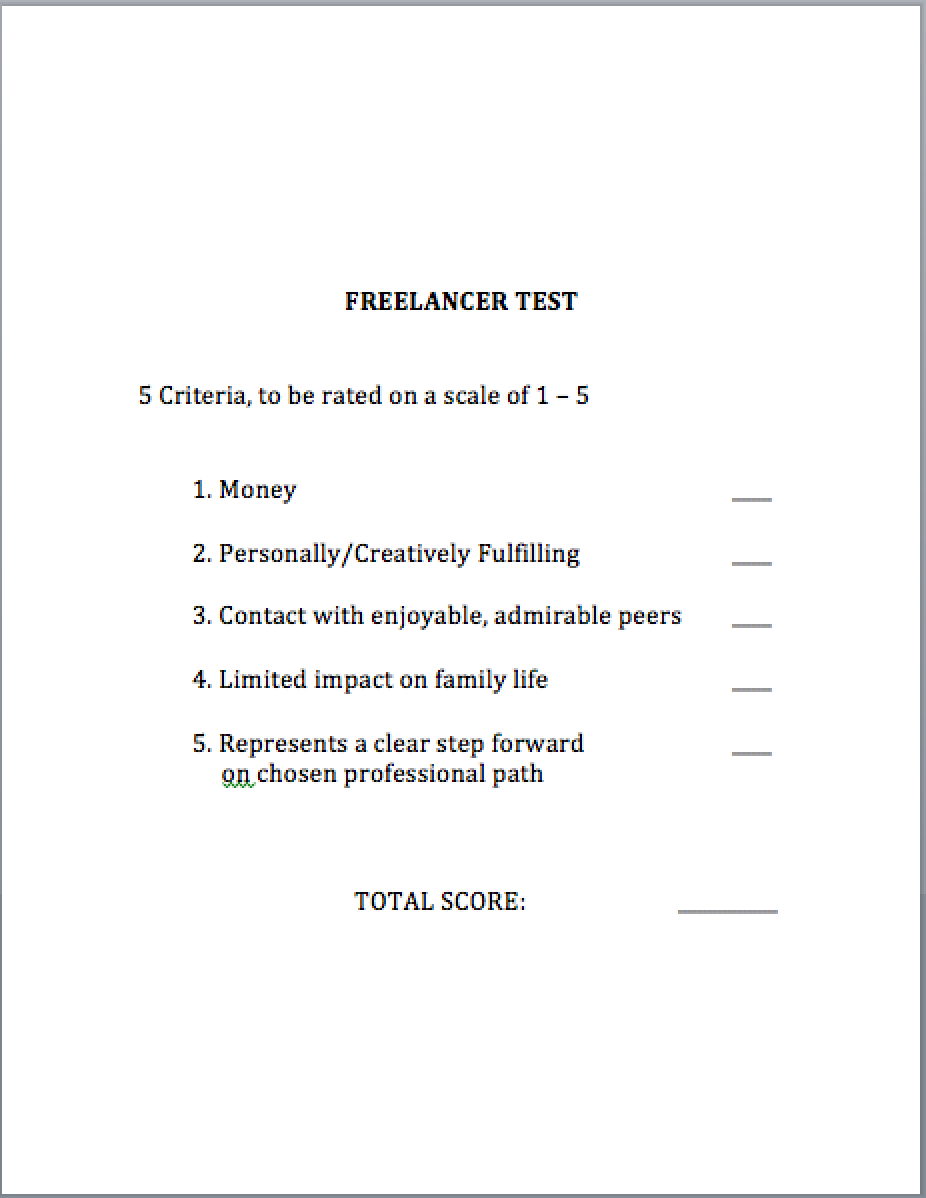No one wants to pass up a “great opportunity.” Certainly not me. When I was in my 20’s I’d say “yes” to countless stand-up gigs, web-videos, presentation pilots, pop culture blogging, you-name-it.
I needed to build-up my professional resume and I knew I could learn from people who had more experience than I did.
But after a few years of fattening my resume, I was burning myself out on other people’s projects. I didn’t have much to show for it. And mostly I was learning that a lot of the projects weren’t what they promised to be and neither were the people.
Worst of all, the combination of low-paying and no-paying gigs was keeping me from pursuing my own dreams.
But today when someone contacts me with “a great opportunity” I use this simple test (created by my wife and me) to decide what to do.
Once the potential employer/collaborator/Svengali gives me the details on the workload, I rate the project based on these traits.
(1 being the lowest, 5 being the highest)

Money (score it on a scale of 1 – 5)
Is there pay? Is the pay any good? Is there enough money for the amount of time required?
Creatively fulfilling (score it on a scale of 1 – 5)
Will this work be personally satisfying? If not, there better be something else on this list as a reason to do it.
Peers (score it on a scale of 1 – 5)
Will I be in contact with enjoyable, admirable peers? Are these people I want to build a professional relationship with?
Impact on personal life (score it on a scale of 1 – 5)
Will this movie/TV show/interactive online novella get in the way of my time with friends and family? Am I going to be working late nights? Is that worth it?
Beneficial for my Career (score it on a scale of 1 – 5)
Does this job represent a clear step forward on chosen professional path?
HOW TO SCORE THE TEST
Just as New York City has standards about what grade of meat is served in its restaurants, I have a number that a project must clear.
Then I can take a job, provided the sum clears that hurdle.
Sometimes the money’s bad, but the collaborators are good and it’s not too time consuming.
Or maybe the job isn’t a resume builder, but the money’s great.
Or it’s not inspiring people, but the project is something I’ve always wanted to try so it’s personally fulfilling.
I’ve taken every possible combination of traits and I’ve gone into each freelance job knowing exactly why I took it.
NOW IT’S YOUR TURN
Identify your top priorities. Find your cut-off grade.
Maybe you don’t like working early hours.Or you want to work from home. Or you just want to take a one-time gig to put a big-name employer to put on your resume.
How bad does a job have to be for you to say no? (Or how good does a job have to be for you to say yes?)
Once you decide what’s important to you, you can create your own version of the Freelancer’s test and you can start turning down jobs without any regrets or apologies.
* * *
Kevin Maher is an Emmy-nominated comedy writer whose work has been seen on HBO, Comedy Central, CNN and Nickelodeon. Journalists have compared Kevin to Ernie Kovacs and Jonathan Winters, but his highest praise came from Tiger Beat who called him “funny!” Follow him on twitter: @KevinGeeksOut
And see his upcoming live shows during New York Super Week. MORE HERE
RELATED:




Mugs
Wouldn't "Impact" actually be a negative scoring attribute? If I scored a full 5 on potential impact a job might have on my personal life, shouldn't that lower the overall score instead of increase its value? For example, a "perfect score" according to this current measurement would be 21 (5+5+5+5+1) and a score of 25 would actually be "lower" since the impact is greater.
In my proposal, a negative score for impact would create a perfect overall score of 19 and it would only get lower from there – the greater the impact, or the lower the other values of the remaining criteria.
Just my two cents – I think it's otherwise a valuable gauge for assessing the worth of a prospective job.